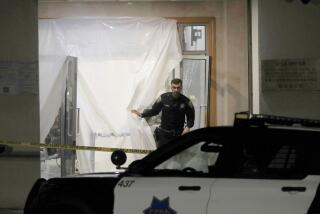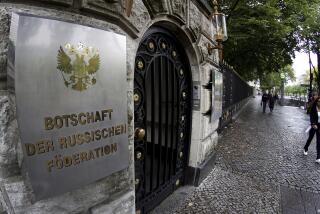Bay Area Departures May Benefit FBI
SAN FRANCISCO â The expulsion of 13 officials from the Soviet Consulate here will hamper the Sovietsâ spying efforts and will improve the FBIâs counterintelligence stance in California, at least in the short term, government sources said Tuesday.
Over time, the Soviets probably will rebuild their intelligence-gathering capabilities--but only at great expense and effort, according to espionage experts here and in Los Angeles and Washington.
âIf you take (13) trained intelligence officers out,â said one veteran counterintelligence officer, âthat means that you are doing a hell of a lot of damage. You just canât pick up again that easily.â
Not Enough U.S. Agents
âItâs got to help,â said another agent. âThe problem for us for years is that we just donât have enough agents to follow all of the Soviet Bloc intelligence officers operating out of the San Francisco area.â
The Soviet Consulate, housed in a six-story building in the exclusive residential district called Cow Hollow, is widely regarded by the FBI as the West Coast espionage command center for Soviet Bloc nations. It has been linked to one major West Coast spy case, and other would-be spies were arrested after they telephoned the mission offering to supply military secrets.
While the expulsion of 13 consular officers--all described by U.S. officials as spies operating under diplomatic cover--was characterized as a setback for the Soviets, counterintelligence officials expressed little doubt that the spying effort would be renewed.
âIn the short term, they lose. In the long term, they may get to where they are now. . . . The intelligence function will go on,â one veteran agent said.
In some ways, the replacement agents may be tougher to counter, FBI agents said. As part of the rebuilding effort, the Soviets may make heavier use of âillegal agents,â spies not operating under a diplomatic cover, who may be in the United States illegally.
âIllegal agentsâ are more difficult for the FBI to track than the spies who work out of the consulate under diplomatic cover, agents said.
According to the FBI, the consulate, one of only three Soviet diplomatic outposts in the United States--the others are the embassy in Washington and the Soviet mission at the United Nations--had 45 to 55 Soviet employees, including cooks, guards, drivers, clerks, diplomats and intelligence officers, before the expulsion order.
Variation in Estimate
The State Department count of the number of employees differed from FBI estimates. A State Department spokesman said the current number is 38, a figure that will be reduced by 12, so that no more than 26 Soviets will be allowed in the San Francisco mission. The United States will allow Moscow to replace one of the 13 officers who must leave the country by Nov. 1.
FBI officials estimate that a third of the consulateâs employees are agents of either the KGB secret police or the GRU, the military branch of Soviet intelligence.
Of the 13 San Francisco-based Soviets ordered to leave the country within 10 days, only the name of Lev Zaytsev was released by State Department officials in Washington. Zaytsev is a suspected Soviet KGB agent who is carried on the diplomatic rolls as a consul, according to a counterintelligence source.
âHe is certainly an influential figure,â the source said, adding that all those to be expelled were âinvolved in intelligence-gathering.â
Soviet Vice Consul Gennady German emerged from the San Francisco consulate shortly after the morning announcement in Washington to say he had no comment on the expulsions. He stepped out again later in the day, saying simply, âItâs unfair.â
One of the Soviet agentsâ main tasks has been to gather technology from the Silicon Valley, located 40 miles south of here in Santa Clara County, as well as information from the many U.S. military bases and defense contractors nearby, according to FBI sources. The consulate is only a few blocks from the Presidio, a U.S. Army base. Many of the antennas atop the building are thought to be used for monitoring U.S. communications.
Dan Morain reported from San Francisco and William Overend from Los Angeles.
More to Read
Sign up for Essential California
The most important California stories and recommendations in your inbox every morning.
You may occasionally receive promotional content from the Los Angeles Times.





![[20060326 (LA/A20) -- STATING THE CASE: Marchers organized by unions, religious organizations and immigrants rights groups carry signs and chant in downtown L.A. "People are really upset that all the work they do, everything that they give to this nation, is ignored," said Angelica Salas of the Coalition of Humane Immigrant Rights. -- PHOTOGRAPHER: Photographs by Gina Ferazzi The Los Angeles Times] *** [Ferazzi, Gina -- - 109170.ME.0325.rights.12.GMF- Gina Ferazzi/Los Angeles Times - Thousands of protesters march to city hall in downtown Los Angeles Saturday, March 25, 2006. They are protesting against House-passed HR 4437, an anti-immigration bill that opponents say will criminalize millions of immigrant families and anyone who comes into contact with them.]](https://ca-times.brightspotcdn.com/dims4/default/34f403d/2147483647/strip/true/crop/1983x1322+109+0/resize/840x560!/quality/75/?url=https%3A%2F%2Fcalifornia-times-brightspot.s3.amazonaws.com%2Fzbk%2Fdamlat_images%2FLA%2FLA_PHOTO_ARCHIVE%2FSDOCS%2854%29%2Fkx3lslnc.JPG)




